Léontine Massart (1885-1980) was a French stage and screen actress of Belgian origin. She peaked in the French silent film of the early 1910s.
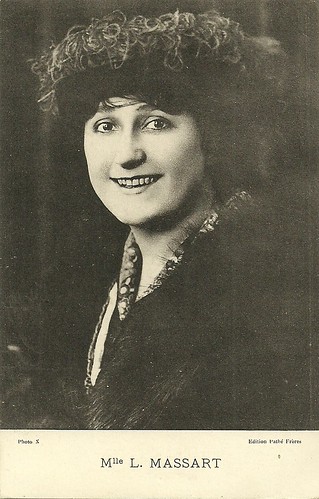
French postcard bt Edition Pathé Frères. Photo: X.
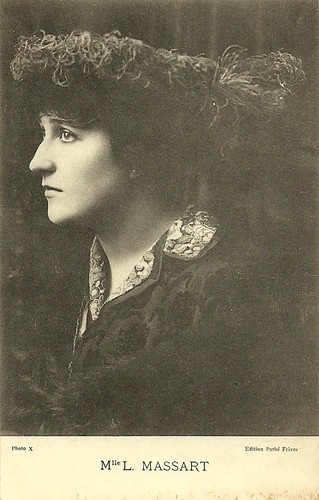
French postcard by Pathé Frères. Photo: X.
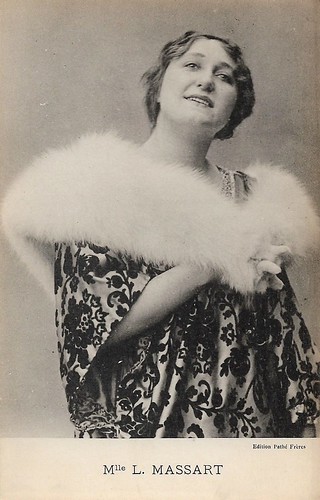
French postcard by Edition Pathé Frères. Caption: Mlle L. Massart.
Léontine Massart was born in Brussels in 1885. She was the sister of Mary Massart, who would marry and become the muse of French film director René Plaisetty. Mary acted in his films between 1918 and 1922.
Stage director and actor Firmin Gémier discovered Léontine Massart in Brussels, where she was acting with an amateur theatre company. She joined him in Paris, where in 1909 she acted in his direction of 'Master Bob, gagnant du Derby' by Henry de Brisay and Marcel Lauras. From 1909, she also acted at the companies of the Théâtre de l'Ambigu and the Théâtre Antoine.
Parallel she ran a career as silent film actress, in particular in many films directed by Camille de Morlhon whose muse or fetish she was for several years. From 1912 Massart exclusively focused on film acting, though she did direct one play during the First World War: Bravo (1916).
In 1908, Léontine Massart made her cinema debut in Albert Capellani’s Jeanne d’Arc / La vie de Jeanne d’Arc, right away playing the title role. After this production at Pathé Frères, she became a regular Pathé actress, acting in countless shorts by the company of the Red Rooster.
Her repertory included historical and biblical dramas, such as Le tyran de Jérusalem (Camille de Morlhon, 1910) after Tasso, Le siège de Calais (Henri Andréani, 1911), Le jugement de Salomon (Henri Andréani, 1912), Le fils prodigue (Camille de Morlhon, 1912), Don Quichotte (Camille de Morlhon, 1913), La reine Margot (Henri Desfontaines, 1914) – in which she had the title role again, and Christophe Colomb (Gérard Bourgeois 1916) – in which she played Queen Isabella.

French postcard by Édition Pathé Frères.

French postcard by Edition Pathé Frères. Photo: X.

French postcard by Edition Pathé Frères. Photo: X.
Léontine Massart also performed in modern dramas such as Par l’enfant (Camille de Morlhon, 1909), Le violon de grand-père (Michel Carré, 1911), L’envieuse (Albert Capellani, 1911), La fille des chiffoniers (Georges Monca, 1912), La broyeuse de coeurs (Camille de Morlhon, 1913) and Sacrifice surhumain (Camille de Morlhon, 1914).
She also figured in several comedies and farces, such as some of the Rigadin comedies with the actor Prince, including Rigadin veut dormir tranquille (Georges Monca, 1910) and Le voile du bonheur (Albert Capellani, 1910). The latter was based on a play by Georges Clemenceau, who is more famous as a politician and whose only artistic work this was.
While Léontine Massart had a quite steady career in the 1910s up to the 1919 drama Le calvaire d’une reine by René Leprince and Ferdinand Zecca, she only performed in one film in the 1920s. She only played in Mon p’tit (René Plaisetty, 1925) starring Arlette Marchal It was also her last film.
By then, she was 40. All in all Massart had acted in well over 40 films, both short and feature-length, and almost 20 of these were directed by Camille De Morlhon. Important male partners of Massart in these years were Henry Krauss, Henri Etievant, Pierre Magnier, Jean Kemm, Paul Capellani, Jean Dax, Firmin Gémier, and, in particular, Paul Franck.
Léontine Massart died in Paris in 1980 at the high age of 95 years.

Spanish collector card by Empresa Cinematografica Barcelona, no. A-12. Photo: Argos P.C., Films Cinematographiques. Scene from the Franco-Spanish production La vida de Cristóbal Colon / Vida de Cristóbal Colón y su descubrimiento de América / La vie de Christophe Colomb / Christophe Colomb / The Life of Christopher Columbus (Gérard Bourgeois, 1916), starring Georges Wague as Columbus, Jean Garat as Bartholomew Columbus and Léontine Massart as Queen Isabella. Caption: Soon after the conquest of Granada, Columbus meets the Catholic Royal Couple. While Ferdinand of Aragon is a practical man and doesn't care about theory or ideals, Queen Isabella is inclined to help Columbus' visions, feeling her generosity may also offer new stars to her crown. This card shows the actors at the Alhambra in Granada.
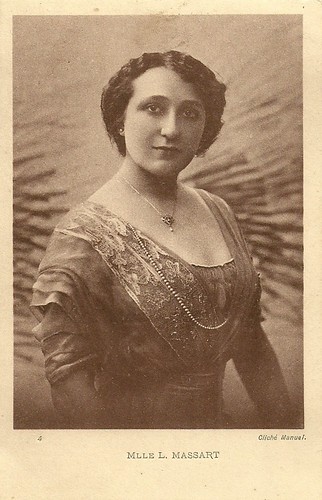
French postcard, no. 4. Photo: Manuel.
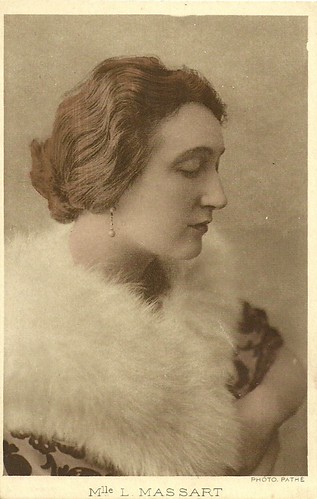
French postcard. Photo: Pathé.
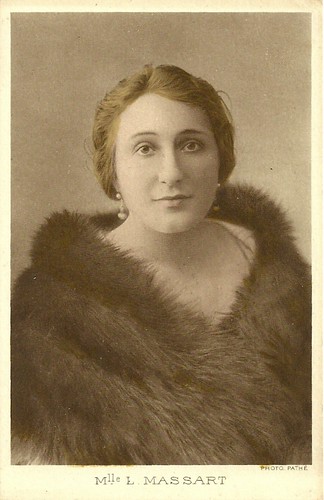
French postcard. Photo Pathé.
Sources: Wikipedia (French) and IMDb.
This post was last updated on 5 June 2025.

French postcard bt Edition Pathé Frères. Photo: X.

French postcard by Pathé Frères. Photo: X.

French postcard by Edition Pathé Frères. Caption: Mlle L. Massart.
Muse or fetish
Léontine Massart was born in Brussels in 1885. She was the sister of Mary Massart, who would marry and become the muse of French film director René Plaisetty. Mary acted in his films between 1918 and 1922.
Stage director and actor Firmin Gémier discovered Léontine Massart in Brussels, where she was acting with an amateur theatre company. She joined him in Paris, where in 1909 she acted in his direction of 'Master Bob, gagnant du Derby' by Henry de Brisay and Marcel Lauras. From 1909, she also acted at the companies of the Théâtre de l'Ambigu and the Théâtre Antoine.
Parallel she ran a career as silent film actress, in particular in many films directed by Camille de Morlhon whose muse or fetish she was for several years. From 1912 Massart exclusively focused on film acting, though she did direct one play during the First World War: Bravo (1916).
In 1908, Léontine Massart made her cinema debut in Albert Capellani’s Jeanne d’Arc / La vie de Jeanne d’Arc, right away playing the title role. After this production at Pathé Frères, she became a regular Pathé actress, acting in countless shorts by the company of the Red Rooster.
Her repertory included historical and biblical dramas, such as Le tyran de Jérusalem (Camille de Morlhon, 1910) after Tasso, Le siège de Calais (Henri Andréani, 1911), Le jugement de Salomon (Henri Andréani, 1912), Le fils prodigue (Camille de Morlhon, 1912), Don Quichotte (Camille de Morlhon, 1913), La reine Margot (Henri Desfontaines, 1914) – in which she had the title role again, and Christophe Colomb (Gérard Bourgeois 1916) – in which she played Queen Isabella.

French postcard by Édition Pathé Frères.

French postcard by Edition Pathé Frères. Photo: X.

French postcard by Edition Pathé Frères. Photo: X.
The end of a steady career
Léontine Massart also performed in modern dramas such as Par l’enfant (Camille de Morlhon, 1909), Le violon de grand-père (Michel Carré, 1911), L’envieuse (Albert Capellani, 1911), La fille des chiffoniers (Georges Monca, 1912), La broyeuse de coeurs (Camille de Morlhon, 1913) and Sacrifice surhumain (Camille de Morlhon, 1914).
She also figured in several comedies and farces, such as some of the Rigadin comedies with the actor Prince, including Rigadin veut dormir tranquille (Georges Monca, 1910) and Le voile du bonheur (Albert Capellani, 1910). The latter was based on a play by Georges Clemenceau, who is more famous as a politician and whose only artistic work this was.
While Léontine Massart had a quite steady career in the 1910s up to the 1919 drama Le calvaire d’une reine by René Leprince and Ferdinand Zecca, she only performed in one film in the 1920s. She only played in Mon p’tit (René Plaisetty, 1925) starring Arlette Marchal It was also her last film.
By then, she was 40. All in all Massart had acted in well over 40 films, both short and feature-length, and almost 20 of these were directed by Camille De Morlhon. Important male partners of Massart in these years were Henry Krauss, Henri Etievant, Pierre Magnier, Jean Kemm, Paul Capellani, Jean Dax, Firmin Gémier, and, in particular, Paul Franck.
Léontine Massart died in Paris in 1980 at the high age of 95 years.

Spanish collector card by Empresa Cinematografica Barcelona, no. A-12. Photo: Argos P.C., Films Cinematographiques. Scene from the Franco-Spanish production La vida de Cristóbal Colon / Vida de Cristóbal Colón y su descubrimiento de América / La vie de Christophe Colomb / Christophe Colomb / The Life of Christopher Columbus (Gérard Bourgeois, 1916), starring Georges Wague as Columbus, Jean Garat as Bartholomew Columbus and Léontine Massart as Queen Isabella. Caption: Soon after the conquest of Granada, Columbus meets the Catholic Royal Couple. While Ferdinand of Aragon is a practical man and doesn't care about theory or ideals, Queen Isabella is inclined to help Columbus' visions, feeling her generosity may also offer new stars to her crown. This card shows the actors at the Alhambra in Granada.

French postcard, no. 4. Photo: Manuel.

French postcard. Photo: Pathé.

French postcard. Photo Pathé.
Sources: Wikipedia (French) and IMDb.
This post was last updated on 5 June 2025.
1 comment:
What a wonderful post! By the way, I loved your story about your Dad. lol He's the same age my Dad would have been this coming January. It sounds like he had a wonderful day! :D
Post a Comment